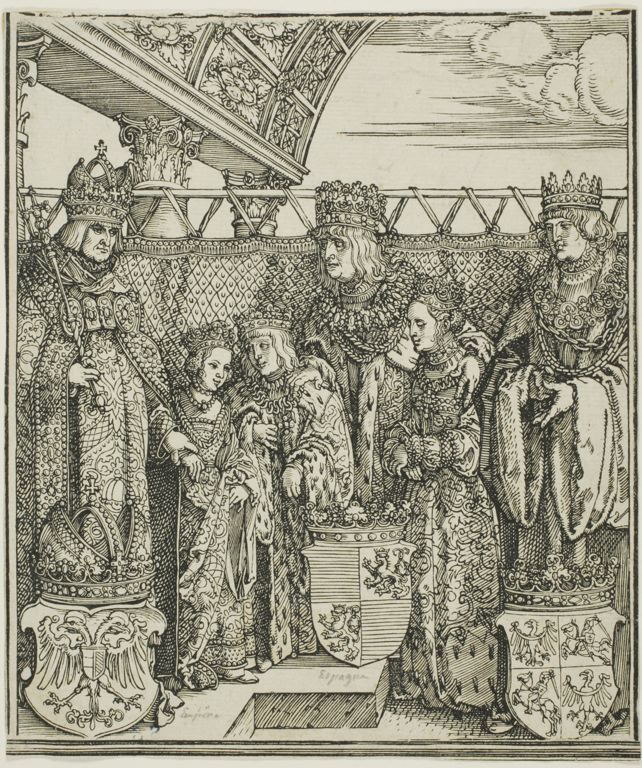 |
| Double Betrothal at Vienna, from The Triumphal Arch of Maximilian I, 1515, by Albrecht Durer |
The Habsburgs intermarried with other noble families and when these other families had died out in the male line, they swept up the leavings. ‘Generation after generation, they produce heirs; if sons were missing, then cousins and nephews were always at hand,’ Rady explains. ‘With longevity came the opportunity to take the wealth of the less enduring families into which they had married.’
Thus, Count Rudolf of Habsburg (lived 1218-91), whose mother was a Kiburg, took the large part of the Kiburg patrimony when their male line expired. As the most powerful family in the duchy of Swabia, they set their sights on the Holy Roman Empire. Rudolf captured lands in Austria and became king of Bohemia, but the title of emperor eluded him. The Habsburgs then went into a temporary decline.
A bold stroke was required and it was this: they decided ‘to jettison their Swabian past and became instead Austrians and Romans’. It was another Rudolf of Habsburg (1339-65) who restored the family’s fortunes ‘with an energy, pace, and imagination that belied his youth and confounded his rivals’.
And the key to his success was forgery. Under his direction, scholars cooked up a couple of bogus charters, the ‘Pseudo-Henry’ and the ‘Greater Privilege’, which purported to demonstrate Austrian exceptionalism by establishing spurious links to Julius Caesar and Nero and to make the Duke of Austria a palatine archduke, with duchy heritable by son or daughter. Although, again, the imperial crown proved elusive, ‘by giving the Habsburgs a historical consciousness and set of beliefs about themselves, Rudolf made them more than just a group of blood relatives’.
Unlike other aristocratic families, the Habsburgs operated a system of collective inheritance. King Sigismund of Bohemia and Hungary, who had no heirs, nominated Duke Albert of Habsburg (lived 1397-1439) as his successor, and Albert became the first Habsburg to be elected as Holy Roman Emperor in 1438. (Read more.)Share

















No comments:
Post a Comment